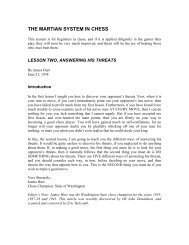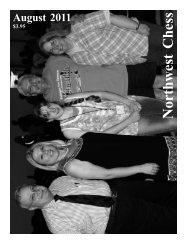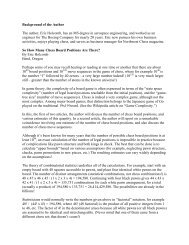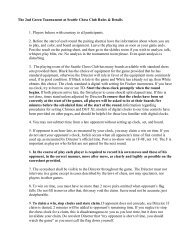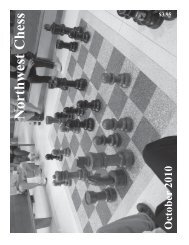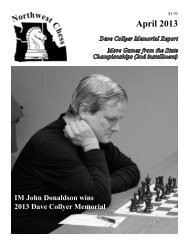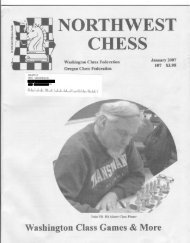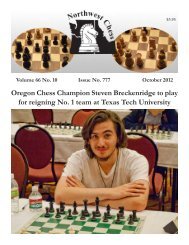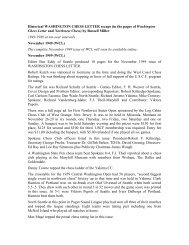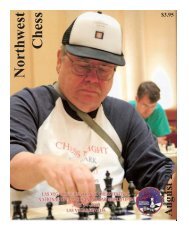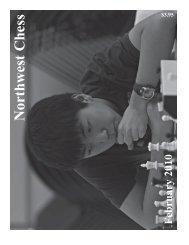January, 2012 - Idaho Chess Association
January, 2012 - Idaho Chess Association
January, 2012 - Idaho Chess Association
Create successful ePaper yourself
Turn your PDF publications into a flip-book with our unique Google optimized e-Paper software.
15.¥a4+ ¥d7 16.e5 dxe5 17.£xe5<br />
looked like too much to calculate) 12...<br />
¤c6 13.¥a4 ¥b7 (13...¥d7 14.¥f4±)<br />
14.e5 dxe5 15.£xd8+ ¦xd8 16.¤xe5<br />
¦c8 17.¦e1 ¢f8 18.¤c4 and here I'm<br />
probably a little better.<br />
11...dxc3 12.bxc3 bxc3<br />
I definitely thought that allowing me<br />
to take on b4 was better, e.g., 12...O-O<br />
13.cxb4 ¤c6 followed by ...¦b8 or<br />
...¤xb4.<br />
13.¤xc3<br />
Now, I'm a little happier. I have a lot<br />
of space and kingside play versus his lack<br />
of development.<br />
13...O-O 14.h3<br />
A quiet, positional move.<br />
14...¥b7<br />
A small mistake of which I took advantage.<br />
15.¤g5!<br />
XABCDEFGHY<br />
8rsn-wq-trk+(<br />
7+lzp-vlpzpp'<br />
6p+-zp-sn-+&<br />
5zP-+-+-sN-%<br />
4-+-+P+-+$<br />
3+LsN-+-+P#<br />
2-+-+-zPP+"<br />
1tR-vLQ+RmK-!<br />
xabcdefghy<br />
Threatening ¤xf7.<br />
15...¥c6<br />
I had planned for 15...¥c8 16.¤d5!<br />
(The computer likes 16.e5! dxe5 17.<br />
£xd8 ¥xd8 18.¥a3 h6 19.¥xf8 hxg5<br />
20.¦fd1 ¤c6 21.¥c5 ¥f5 22.g4, winning.)<br />
and then if 16...¤xd5? 17.£xd5<br />
c6 18.¤xf7!, I calculated that the only<br />
way to avoid losing the Exchange was<br />
18...£e8 19.¤xd6+ cxd5 20.¥xd5+<br />
¢h8 21.¤xe8 ¦a7 22.¥e3 ¦d7<br />
23.¦ab1, which should be pretty easily<br />
won. 15...£e8 is best.<br />
16.¦e1<br />
I missed 16.e5 dxe5 17.£xd8 ¥xd8<br />
18.¥a3 with an edge, e.g., 18...¤h5 19.<br />
¥xf8 ¥xg5 20.¥a3±.<br />
16...h6 17.¤f3 ¤h7?<br />
He needed to play 17...¤bd7 18.<br />
¤d4 ¥b7 19.¤f5 ¦b8 20.¦b1 ¤e5<br />
21.f4 ¤g6 22.£c2 £d7, which the computer<br />
gives as equal.<br />
18.¥b2 ¥d7<br />
Again, 18...¤d7 was necessary, e.g.,<br />
19.¤d4 ¥b7 20.¤f5 ¥f6 21.£g4 ¢h8.<br />
19.¤d5 ¤c6 20.£c2!<br />
Intending ¦ad1 and e4-e5. I considered<br />
20.¥a4 ¦b8 21.£c2, but wanted<br />
to play ¦d1 sooner.<br />
20...¥f6 21.¤xf6+ ¤xf6 22.¦ad1!<br />
22.e5 dxe5 23.¤xe5 ¤xe5 24.<br />
¦xe5 ¦b8 25.¦e3 is also promising.<br />
XABCDEFGHY<br />
8r+-wq-trk+(<br />
7+-zpl+pzp-'<br />
6p+nzp-sn-zp&<br />
5zP-+-+-+-%<br />
4-+-+P+-+$<br />
3+L+-+N+P#<br />
2-vLQ+-zPP+"<br />
1+-+RtR-mK-!<br />
xabcdefghy<br />
22...¦b8<br />
22...¤xa5 23.e5 dxe5 (23...¤e8 24.<br />
¥a2±; 23...¤xb3 24.exf6 ¤c5 25.fxg7<br />
¦e8 26.£d2 ¢h7 27.¦xe8 £xe8<br />
28.¦e1 with £f4! coming, as 28...¤e4<br />
29.g8=£ loses a piece) 24.¤xe5 ¤xb3<br />
25.¤c6! (winning the Queen) 25...¤d4!<br />
(25...£e8 26.¦xe8 ¦fxe8 27.¥xf6<br />
¥xc6 28.£xc6 gxf6 29.¦d3 and White<br />
wins) 26.¦xd4 ¦e8 27.¤xd8 ¦xe1+<br />
28.¢h2 ¦xd8 29.¦d3 (29.£xc7?<br />
¦c8) 29...¤e8 30.¥xg7!, winning.<br />
23.e5 ¤e8 24.exd6 ¤xd6 25.¥c3<br />
I took advantage of his extreme time<br />
pressure, he had about five minutes to<br />
make fifteen moves, by playing more positionally,<br />
avoiding trades, and keeping<br />
control of diagonals.<br />
25...¤e7<br />
A small mistake.<br />
26.¤e5 ¥f5 27.£a2 ¥g6 28.¥c4<br />
¢h7?<br />
He was down to two minutes. Not<br />
much better was 28...£c8 29.¤xf7!<br />
¥xf7 (29...¦xf7 30.¦xe7 ¤xc4 31.<br />
£xc4 £f5 32.¦xf7 ¥xf7 33.£xa6)<br />
30.¥xf7+ ¦xf7 31.¦xe7 £f5 32.¦xc7<br />
¤b5 33.¦xf7 £xf7 34.£b2, winning.<br />
29.¥xa6 ¦a8 30.¥b7 ¦b8 31.a6<br />
¤ef5??<br />
Getting close to 30 seconds.<br />
32.¤c6 £g5 33.¥d2 £h5 34.<br />
¤xb8 ¤xb7 35.a7 1-0<br />
After the schedule merger, it was<br />
time for me to play Friedel, my second<br />
GM of the tournament, though I am very<br />
humbled by how brilliantly he played.<br />
C60 Ruy Lopez Cozio<br />
GM Josh Friedel (2584)<br />
NM Steven Breckenridge (2290)<br />
Los Angeles, American Open (5) 2011<br />
Annotations by NM Steven Breckenridge<br />
1.e4 e5 2.¤f3 ¤c6 3.¥b5 a6 4.<br />
¥a4 ¤ge7 5.c3 g6 6.O-O ¥g7 7.d4<br />
exd4 8.cxd4 b5 9.¥b3 d6 10.h3<br />
O-O 11.¤c3 ¤a5 12.¥c2 b4 13.<br />
¤e2 ¥b7 14.¤g3<br />
My game against IM Jack Peters a<br />
few tournaments ago went 14.¥f4 f5?!<br />
(14...¦c8 15.¦b1 c5 16.b3 ¤ec6 17.d5<br />
¤a7 ) 15.¤g5 £d7 (Better is15...fxe4<br />
16.¤e6 £d7 17.¤xf8 ¦xf8, when<br />
Black has lots of compensation for the<br />
Exchange, with great squares for his<br />
pieces.) 16.d5 and he went on to win.<br />
14...c5 15.d5<br />
XABCDEFGHY<br />
8r+-wq-trk+(<br />
7+l+-snpvlp'<br />
6p+-zp-+p+&<br />
5sn-zpP+-+-%<br />
4-zp-+P+-+$<br />
3+-+-+NsNP#<br />
2PzPL+-zPP+"<br />
1tR-vLQ+RmK-!<br />
xabcdefghy<br />
Theory has ended and I'm on my<br />
own. I played probably one of the worst<br />
ideas, though it seemed strong.<br />
15...¤c8<br />
Heading for b5 to prevent b2-b3, but<br />
removing a defender from the kingside.<br />
15...¤c4 16.¦b1 £c7 was a better idea,<br />
e.g., 17.¥d3 ¤e5 18.¤xe5 ¥xe5.<br />
16.¦b1 ¤a7<br />
18 <strong>January</strong> <strong>2012</strong> Northwest <strong>Chess</strong>



